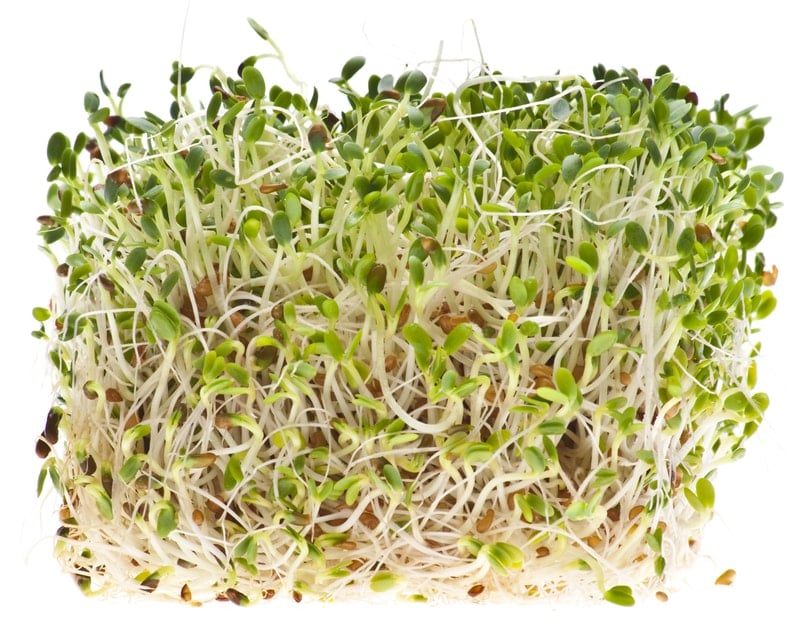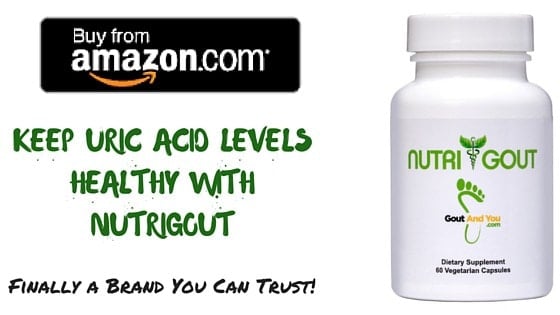Alfalfa In Your Gout Diet
Alfalfa derived from the Arabic al-fac-facah (“father of all foods”) has been grown and consumed since 500 BC by the Chinese and Arabic people who first discovered it and is widely used as a natural home remedy to treat many ailments. For hundreds of years, alfalfa was only used to feed live stock but it started becoming popular again in the 17th century and besides being grown in western Asia, it is also native in the Mediterranean region. Now the US is the largest alfalfa producer in the world where the alfalfa plant was introduced in 1860 and primarily grown in California, Wisconsin and South Dakota.
Alfalfa is part of the legume family but it’s also a herb. It is famous for its tolerance of drought, heat and cold and that is the reason it can be sown in spring as well as in the fall. It can be grown in the northern cold mountains and valleys; as well as in Mediterranean and steaming hot desert climates! Because of its very deep rooted system, alfalfa can efficiently absorb many nutrients from the soil. It is a flowering plant of the pea family and its scientific name is Medicago sativa. Alfalfa today is considered a valuable plant because it is very rich in vitamins, minerals, and proteins. A cup of alfalfa sprouts only has 8 calories in it but it already contains vitamin K, C, copper, manganese, thiamine, folate, magnesium, iron, and riboflavin.
The flowers, leaves, tops, seeds and sprouts are used from alfalfa to treat various conditions. The flowers and leaves are used for tonic purposes and may help in treating arthritis, gout and other blood conditions since it is a blood alkalinizer, as well as a natural detoxifier. The seeds of alfalfa are mostly used to treat hangovers and stomach aches while the sprouts are used in salad. Alfalfa’s tender shoots are consumed in some places as a leaf vegetable.
In addition, it is also available as a juice, since in Chinese medicine it is used to treat kidney and bladder stones. The root of alfalfa is also used in Chinese medicine that may improve urine flow, may help reduce fever and may help treat jaundice in babies. You can also find dehydrated alfalfa leaf which is commercially available as a weight loss supplement in the form of powders, tablets, liquid extracts and tea which is widely touted globally as a health tonic.
Alfalfa may help control uric acid
The leaves of the alfalfa plant are rich in minerals, essential amino acids and nutrients (phosphorous, calcium, magnesium, potassium, and carotene which may help actively promote kidney function) and other minerals. All these minerals are diuretic in nature and, therefore may help to remove fluid accumulations in muscle tissue and joints.
Alfalfa is an excellent natural source of most vitamins: A, B1, B6, B8, B12, C, D, E, K1, P, and U. Alfalfa is also higher in protein than any other plant food (15 to 22% by weight). Alfalfa works by helping to neutralize and may help support uric acid levels in your blood, but it also has natural anti-inflammatory and antioxidant properties, making it a good choice to consume alfalfa for the gout sufferer. What alfalfa may do very well is flush out uric acid levels in your urine which can help reduce the excess amount of uric acid available to crystallize and give you a gout attack.
Most studies done on alfalfa with animals and humans indicate alfalfa supplements may reduce levels of blood sugar and low-density lipoprotein cholesterol, the so-called bad cholesterol, according to the US National Institutes of Health. So be aware that there aren’t any studies proving that alfalfa is a cure-all for gout but again it there’s definitely no harm in using it in your diet. I personally use it in my salads and sandwiches and I’m starting to see more and more restaurants adding alfalfa as an ingredient in salads and sandwiches, it’s finally mainstream.
Other Health Benefits of Alfalfa
-
Alfalfa Has Strong Antioxidant Effects
Alfalfa is a popular herb used in Ayurvedic medicine since it can treat various ailments caused by inflammation and oxidative damage. This is thanks to alfalfa’s rich antioxidant properties which can reduce cell death and DNA damage.
-
Alfalfa Can Help Lower Cholesterol
Numerous animal studies on alfalfa show its potential for lowering blood cholesterol levels. In a human study, they found that just eating 40 grams of alfalfa thrice a day helped lower bad cholesterol after 8 weeks. This is because alfalfa is high in a bioactive plant compound called saponins which is known to help reduce cholesterol levels. Saponin is able to do this by decreasing the amount of cholesterol absorbed in the gut and increasing the compounds being excreted by the body.on is able
-
Alfalfa Can Enhance Metabolic Health
One animal study has found that alfalfa supplements can decrease cholesterol levels and enhance blood sugar control. In another study involving mice, they found that alfalfa extract was able to reduce blood sugar levels by fast tracking the release of insulin. This is not to say that alfalfa can treat diabetes but it shows promise for helping diabetics manage their symptoms. reduce blood sugar.
-
Alfalfa Can Resolve Menopause Symptoms
Another plant compound that alfalfa is rich in is phytoestrogen. This compound is similar to the hormone estrogen and it is said to have the same effect on a woman’s body. In one study involving 20 women, they found that sage and alfalfa extract was able to get rid of night sweats and hot flashes that these women experienced. Although there are not enough studies to prove this. This estrogen effect may also help women suffering from breast cancer. ,
Ways to Prepare Alfalfa
Alfalfa can be taken in tablet or powdered form. You can also make the alfalfa supplements into a tea. But you want to be sure that you are buying from a reputable source since alfalfa in these forms do not contain accurate information on dosage.
You may also simply add alfalfa sprouts into your diet. What’s great about this plant is that it’s very versatile. You can add the sprouts to salads, sandwiches, omelets, rolls, stir fries, burgers, and soups.
Another great thing about alfalfa sprouts is you can make it yourself! Here’s how:
- Get 2 tablespoons of alfalfa seeds and put them in a bowl together with cold water. The water should be three times the amount of seeds. So for 2 tablespoons of seeds, that’s 6 tablespoons of water.
- Let the seeds soak in the bowl for 8 to 12 hours.
- Drain the water from the bowl and rinse the sprouts until all the water residue from the soak is gone.
- Put the sprouts away where there is no direct sunlight. For the next three days, you only need to rinse and drain them every 8 to 12 hours.
- On the fourth day, transfer the bowl in an area that has direct sunlight. This allows the photosynthesis process to begin. Continue rinsing and draining your sprouts everyin 8 to 12 hours.3
- On the 5th or 6th day, you should notice a growth in your sprouts, in which case, they are ready to eat.
Alfalfa Risks
Alfalfa may be a powerful natural remedy but it does come with its own risks for certain individuals. For pregnant women, consuming alfalfa may result in uterine contractions.If you take blood thinners, you cannot take alfalfa since it is high in vitamin K which is known to reduce the efficacy of warfarin, a blood-thinning medication.
For patients with autoimmune disorders such as lupus, alfalfa sprouts are to be avoided since it can stimulate the immune system. If your immune system is compromised, it’s even more important that you avoid alfalfa since it can be contaminated in bacteria potentially making you sick.
In Conclusion
Finally, make sure to speak with your doctor before adding alfalfa in your diet and deciding which form you choose to consume it as, so it doesn’t interact with any other drugs or therapies you may be involved in and harm your health. If you suffer from gout, you should consume at least fresh alfalfa making it a health food for the gout sufferer.
What has your experience been like consuming alfalfa for gout? Share your thoughts in the comments below.

